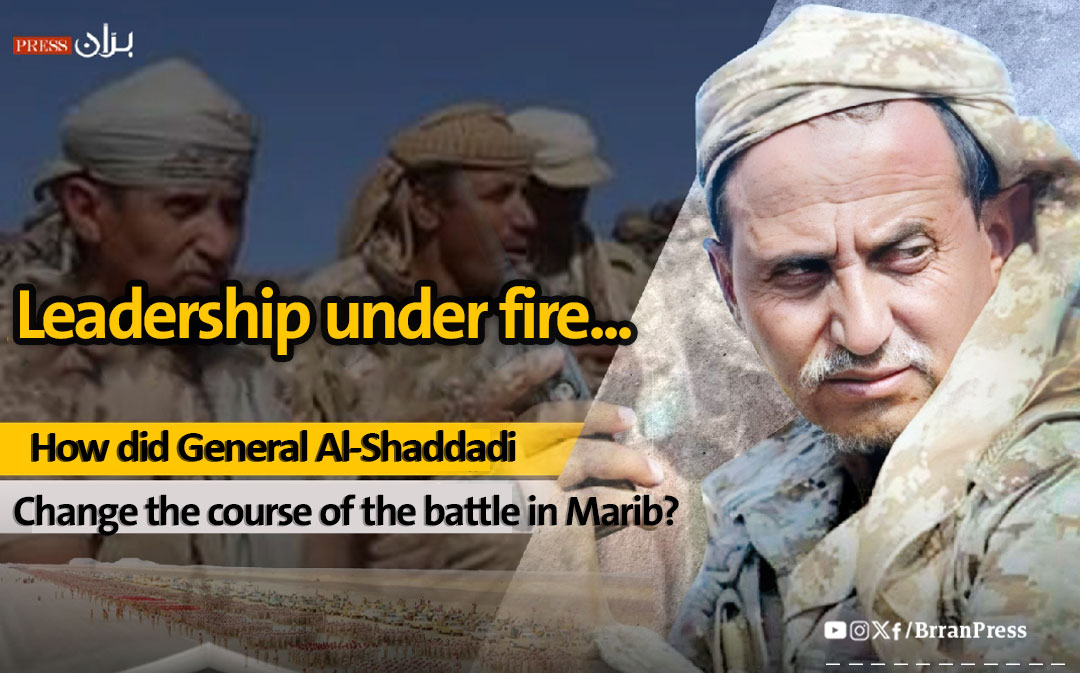


Barran Press
Monday, October 7, 2024, marks the eighth anniversary of the martyrdom of Lieutenant General Abdul Rab Al-Shaddadi, who valiantly led the fight against the Iranian-backed Houthi group on the Sarwah Front in western Marib Governorate, northeastern Yemen.
Al-Shaddadi played a pivotal role in uniting military and civilian efforts to defend Marib. After assuming command of the Third Military Region in April 2015, he transformed the battle from a defensive stance to an offensive one, successfully reclaiming areas under Houthi control during perilous times.
A Symbol of National Pride
Reflecting on Al-Shaddadi’s contributions, Sheikh Nasser Mabrouk Raqib, advisor to the governor of Marib for security affairs, remarked that the commander “wore the military uniform when many had cast theirs aside out of fear.” In a video statement to Bran Press, he emphasized that Al-Shaddadi “carried the banner of the Republic of Yemen” at a time when many leaders abandoned their posts during the Houthi takeover of Sana’a, describing his stance as “clear and courageous.”
Sheikh Raqib noted, “The brave men of the military and the heroes of popular resistance rallied around him, uniting under his leadership during the darkest and most challenging circumstances.”
Leading Amidst Chaos
Al-Shaddadi’s appointment as commander of the Third Military Region came during intense fighting on the governorate’s outskirts. Eyewitness accounts highlight his unparalleled bravery as he led troops and resistance fighters to confront the Houthis head-on.
Major General Faisal Ali Qaid Hassan, former commander of the military region, shared with Bran Press that Al-Shaddadi’s leadership emerged during a tumultuous period when “most leaders were distracted, some fled abroad, and others remained passive or supported the Houthis.” He praised Al-Shaddadi’s steadfastness, stating that he “was undeterred by the shelling and gunfire, managing the battle until the moment of victory against the Houthi militia.”
Al-Shaddadi’s proactive stance instilled confidence in his men, and he was known to advance alongside them during combat, continually uplifting their spirits until his martyrdom.
Revitalizing the Military Forces
Al-Shaddadi’s significant role in countering the Houthis is underscored by Major General Faisal Ali, who noted his ability to consolidate officers and soldiers from various units into cohesive battalions. At a time when the Yemeni army was fragmented and many had either defected or retreated, Al-Shaddadi organized the troops arriving in Marib and welcomed tribal volunteers to bolster the ranks.
His leadership was instrumental in reorganizing and preparing these forces for combat, and his efforts were described as both “prominent and impactful.”
Pivotal Engagements
On the battlefield, Major General Faisal Ali recounted how Al-Shaddadi was always at the forefront, initially liberating the Al-Jufinah area south of Marib city before advancing towards Serwah, where he ultimately fell in battle on October 7, 2016.
Comrades remember how Al-Shaddadi galvanized local fighters to reclaim territory around Marib city, with military operations escalating following the arrival of equipment from the Saudi-led Arab coalition in August 2015. Under his command, the army successfully launched operations to liberate key areas, achieving significant victories that paved the way for further advances.
A Legacy of Valor and Integrity
Over the past decade, Al-Shaddadi’s courage and high moral standards have remained central to the narratives shared by leaders and soldiers alike. Major General Faisal Ali described him as “courageous, resilient, and a knight unmatched in valor,” a testament underscored by his martyrdom on the front lines.
Sheikh Nasser Mabrouk characterized Al-Shaddadi as “a beacon of courage and humility,” emphasizing his dedication to leading from the front and his close connection with the people he served.
Ahmed Al-Shaleef, a leader in the Marib Resistance, praised Al-Shaddadi’s qualities, noting his honesty, military insight, and strategic prowess.
Indelible Memories
Those who fought alongside Al-Shaddadi in Marib retain countless memories of his unwavering spirit and resolve. Ahmed Al-Shaleef recalls a powerful statement Al-Shaddadi made during a meeting: “You and I, along with all free people, may perish, but we wish to die in a way that angers our enemies and pleases our Lord.” This sentiment encapsulated their shared commitment to the struggle for Yemen.
Sheikh Nasser Mabrouk shared another memorable moment, recounting Al-Shaddadi’s declaration that “the time of offices is over; we will go to Serwah and lead the battle until victory or martyrdom,” a promise he fulfilled through his actions.
Major General Faisal Ali also remembers a moment two months before Al-Shaddadi’s martyrdom, when he disregarded safety to lead his men into battle, showcasing his fearless nature.
A Call for Reflection and Unity
Despite the administrative paralysis following the Houthis’ takeover of Sana’a in late 2014, Al-Shaddadi successfully mobilized hundreds of recruits and volunteers to mount a defense against their advances. His leadership led to a series of significant victories, reclaiming occupied territories.
On this anniversary, Major General Faisal Ali urges Yemenis to remember Al-Shaddadi’s legacy and the collaborative spirit he embodied. He emphasizes the need for unity among all factions, warning that the threat posed by the Houthis extends beyond political lines and affects every Yemeni.
In conclusion, Sheikh Nasser Mabrouk affirms that “Al-Shaddadi is the true architect of the Second Republic and the commander of its army and popular resistance.” He calls for a collective reflection on this heroic leader’s history and the values he upheld, encouraging all who fought alongside him to emulate his courage, loyalty, and commitment to Yemen’s freedom.